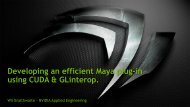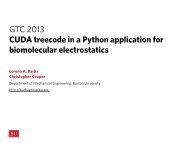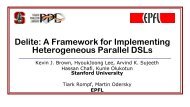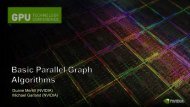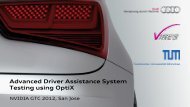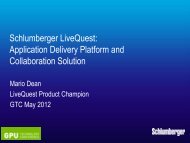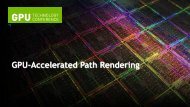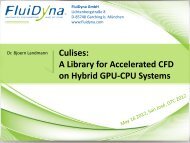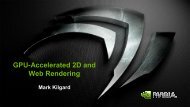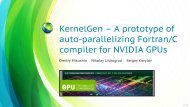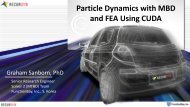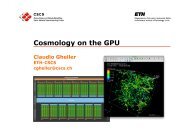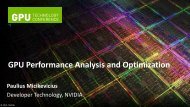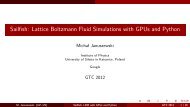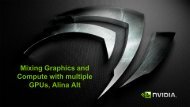GTC 2012 Program Guide - GPU Technology Conference
GTC 2012 Program Guide - GPU Technology Conference
GTC 2012 Program Guide - GPU Technology Conference
You also want an ePaper? Increase the reach of your titles
YUMPU automatically turns print PDFs into web optimized ePapers that Google loves.
TUESDAY<br />
TUESDAY, MAY 15, 16:00 (50 MINUTES)<br />
ROOM A5<br />
S0261 Scalable <strong>GPU</strong> Computing Service Architecture<br />
In this session we describe our <strong>GPU</strong> accelerated computing<br />
service which supports several internal business processes in a<br />
large scale company setup. The service supports diverse<br />
computational needs such as on-demand rendering, mesh<br />
optimization, a Massive Multiplayer Online Game (MMO), product<br />
visualizations and other demanding computational tasks. We<br />
present the architectural considerations for a service-oriented<br />
computational framework and the practical learning’s and<br />
opportunities encountered during development a enterprise<br />
system using NVIDIA technologies such as CUDA, OptiX, OpenGL<br />
and OpenCL. Our aim is to share knowledge and present LEGO’s<br />
vision for a <strong>GPU</strong> accelerated computational platform as a<br />
business-driven technology.<br />
Speaker(s): Henrik Høj Madsen (Solution Architect, LEGO), Michael<br />
Schøler (Senior Consultant, LEGO)<br />
Topic(s): Cloud Computing, Computer Graphics, Ray Tracing<br />
(Intermediate)<br />
TUESDAY, MAY 15, 16:00 (25 MINUTES)<br />
ROOM A7<br />
S0336 <strong>GPU</strong> Acceleration for Seismic<br />
Interpretation Algorithms<br />
The oil and gas industry is already leveraging <strong>GPU</strong>s for seismic<br />
data processing, but what about 3D seismic interpretation? This<br />
session will cover how the <strong>GPU</strong> is being used by TerraSpark<br />
Geosciences to dramatically decrease the runtime of algorithms<br />
for enhancing faults, computing horizon orientation, and<br />
calculating volumetric curvature. We will share our experiences in<br />
porting these techniques to the <strong>GPU</strong>, the challenges encountered,<br />
the solutions found, and, of course, the benefits to execution time.<br />
Speaker(s): Jonathan Marbach (Director, Software Architecture and<br />
Engineering, TerraSpark Geosciences)<br />
Topic(s): Energy Exploration (Beginner)<br />
TUESDAY, MAY 15, 16:00 (50 MINUTES)<br />
ROOM J2<br />
S0356 Optimized Texture Transfers<br />
Many real world graphics applications need to transfer textures<br />
efficiently in and out of <strong>GPU</strong> memory in the form of 2D images,<br />
2.5D terrains or 3D volumes as well as their time-varying<br />
counterparts. The first part of this talk covers technical pointers<br />
on how to optimize your OpenGL application to overlap transfers<br />
with rendering using the NVIDIA Copy Engines. The second part<br />
demonstrates the integration and performance of this feature<br />
within the a real world latency-sensitive broadcast graphics<br />
application from VizRT.<br />
Speaker(s): Shalini Venkataraman (Senior Applied Engineer, NVIDIA),<br />
Gerhard Lang (Chief Engineering Officer, VizRT )<br />
Topic (s): Computer Graphics, Visualization<br />
TUESDAY, MAY 15, 16:00 (50 MINUTES)<br />
ROOM L<br />
S0435 Leveraging GP<strong>GPU</strong> <strong>Technology</strong> for Valuation of<br />
Complex Insurance Products<br />
We share our experiences moving a mature, large scale insurance<br />
application from a CPU to <strong>GPU</strong> environment. This session explores<br />
the nuances of porting a C++ application when ‘blank sheet’<br />
re-architecture is not an option. This session will cover: Insurance<br />
differences from other financial products (and the implications for<br />
the <strong>GPU</strong>), Considerations when moving an existing, fully featured<br />
C++ system to a GP<strong>GPU</strong> platform, Supporting CPU and <strong>GPU</strong><br />
implementations from a single code base, Supporting user defined<br />
code extensions on the <strong>GPU</strong>, CUDA 4.0 C++ extensions: experiences,<br />
challenges and limitations and Performance case study.<br />
Speaker(s): Chris Stiefeling (Oliver Wyman Financial Services)<br />
Topic(s): Finance (Intermediate)<br />
TUESDAY, MAY 15, 16:00 (50 MINUTES)<br />
ROOM N<br />
S0526 Tools for Mobile Computational Photography<br />
This session will talk about advances in Mobile Computational<br />
Photography and the tools that NVIDIA is putting together to<br />
enable these on Tegra powered devices. It will demonstrate the<br />
use of FCam, an Application <strong>Program</strong>ming Interface (API) that<br />
allows for easy and precise control of the camera system. In<br />
addition, the FCam API can enable the application developer to<br />
replace basic camera routines such as metering, which are<br />
typically hidden inside black boxes in traditional camera<br />
programming models.<br />
Speaker(s): Alejandro Troccoli (Mobile Imaging Researcher, NVIDIA)<br />
Topic(s): Computational Photography (Intermediate)<br />
TUESDAY, MAY 15, 16:00 (50 MINUTES)<br />
ROOM M<br />
S0638 Lenovo ThinkStation Accelerates Medical<br />
Research with Beckman Coulter (Presented by Lenovo)<br />
Lenovo ThinkStations utilize Nvidia Maximus technology to<br />
accelerate mission critical applications across multiple industries,<br />
including manufacturing, media & entertainment, and Life<br />
Sciences. Discover how <strong>GPU</strong>s are used to accelerate medical<br />
research from product experts with Lenovo and Beckman Coulter.<br />
Beckman Coulter has utilized Nvidia <strong>GPU</strong>s to reduce software<br />
development and test cycles by 50% with their Kaluza software.<br />
Kaluza is a revolutionary flow cytometry analysis software solution<br />
that provides visualization tools, speed and an innovative<br />
simplicity to the flow community. See how Kaluza allows users to<br />
analyze 10 million cells in real time. Session attendees will<br />
receive a drawing entry to win a brand new ThinkPad Tablet.<br />
Speaker(s): Scott Ruppert (ThinkStation Technical Solutions Manager,<br />
Lenovo), Tanmay Dharmadhikari (Senior Software Development<br />
Engineer, Beckman-Coulter)<br />
Topic(s): Computer Graphics, Life Sciences (Beginner)<br />
TUESDAY, MAY 15, 16:00 (50 MINUTES)<br />
HALL 1<br />
S0641 CUDA 5 and Beyond<br />
CUDA, NVIDIA’s platform for parallel computing, has grown<br />
rapidly in the past 5 years. The performance and efficiency of<br />
software built on CUDA, combined with a thriving ecosystem of<br />
programming languages, libraries, tools, training, and service<br />
providers, have helped make <strong>GPU</strong> computing a leading HPC<br />
technology. CUDA 5 and the Kepler <strong>GPU</strong> architecture don’t just<br />
increase application performance; they enable a more powerful<br />
parallel programming model that expands the possibilities of <strong>GPU</strong><br />
computing, and language features that improve programmer<br />
productivity. In this talk you’ll hear about these revolutionary<br />
features and get insight into the philosophy driving the<br />
development of new CUDA hardware and software. You will learn<br />
about NVIDIA’s vision for CUDA and the challenges for the future<br />
of parallel software development.



